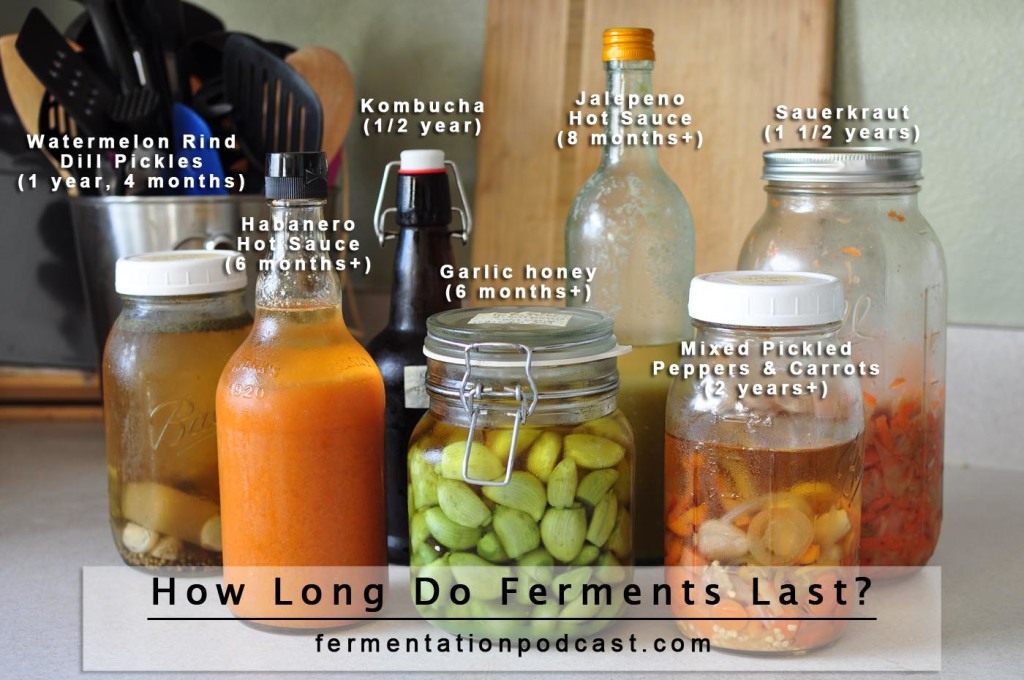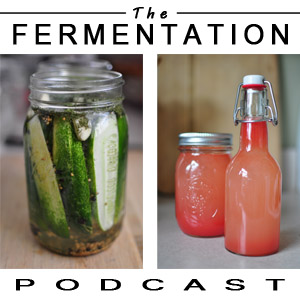DISCLOSURE: This post may contain affiliate links, meaning I get a commission if you decide to make a purchase through my links, at no cost to you. Please read my disclosure for more info.
Some common questions that I see people just getting into fermentation asking is “How long does homemade sauerkraut last?” or “How long do pickles last in the fridge?” In reality though, the question that you’re really trying to answer is actually:
“How long do homemade ferments last?”
There are many factors that determine the “shelf life” of a fermented food or fermented drink but in reality like with so many things, the general answer is: It depends.
In the photo above I show a small collection of ferments that I have in the fridge and their ages as of today, some of which might surprise you.
When I answer the question of how long something fermented will last, I always preface this with saying that this is always a personal preference and I’m just answering for what I do. You always have to figure out what your comfort level is and what you feel is right for you.
For me though, it always boils down to the test we do with our senses. When dealing with fresh and fermented food like this, we’ve always had these amazing senses that give us a clue as to what is good and what might not be so good to eat or drink.
Today foods are so saturated with chemicals, artificial colors, artificial flavors, and even gassed to extend their shelf-life or make them appear fresher than what our natural senses can perceive. Lucky for us though, if you’re reading this and fermenting natural foods, you don’t have to worry about this problem and should be able to figure out what’s okay to eat or drink.
In general when it comes to homemade fermented products (not canned products), what I do is use my senses and make a decision based on that with 3 simple tests:
The Sight Test
- Is there any mold (as opposed to kahm yeast) on your fermented food or beverage?
- If there is mold, can it be removed and what’s left under the brine be salvaged? (I went over this recently in the Episode 11 show and also my post Five Questions on Mold & Food Safety
- Has it turned strange colors?
The Smell Test
- Does it smell rancid or moldy?
- Does it have an “off” smell that doesn’t smell like what you’re expecting?
The Taste Test
After I determine the first two, if it’s passed those two test, I go ahead and give it the old taste test.
- Does it taste bad or have off flavors?
- Does it taste like you’re expecting?
Normally our senses can tell us when something can either make you sick or is bad for you. Like I mentioned above, if it’s a canned product and is low acid, it’s possible that Clostridium botulinum (the bacteria that’s responsible for botulism) could grow because it’s a sealed environment and low acid. Ferments that you make at home are normally high acid so botulism is less of a worry, but in canned products our senses can’t necessarily tell you that there’s a community of botulinum about to make you sick.
Factors that Affect the Life of Your Ferments
There are several factors that I’ve covered before that extend the life of ferments but here are a few:
- Temperature – this is one of the biggest factors. When a ferment is to your liking, this is why it gets moved to the refrigerator. The cold temperature slows down the decomposition process and almost suspends the ferment indefinitely.
- Acid – when most homemade ferments reach their best level, acid is formed that helps to preserve them.
- Anaerobic Environment – keep out the oxygen! Mold loves oxygen. Keep your items submerged and away from oxygen with glass fermentation weights and fermentation lids with air locks.
Shelf Life of Canned Foods vs. Fermented Foods
Canned products have a remarkable shelf life and there have even been tests done on canned foods by the U.S. Army that have determined that many cans are safe to eat many years or even decades after the expiration date.
The only problem with canned foods is that the high level of heat treatment to sterilize the cans or jars also destroys the nutrients, taste, and life that would normally be in that food.
The canning process has been a remarkable discovery and definitely has a great place in terms of a long term food supply that everyone should have as a backup, but if you want healthier food, then fresh and fermented foods and drinks are the way to go.
To put it more simply, shelf-stable long-term storable foods are canned and do less for you in terms of flavor and nutrition, and fermented foods are for every day, short term, but are more nutritious and flavorful.
Personal Taste Preference
Another big factor in terms of keeping your precious ferment around is your personal taste. If you don’t like the texture of something, it’s time to put the nutrients back into the garden and get another one going that you do like.
I’ve had pickles that are perfectly edible and perfectly safe to eat, but they’ve just gotten too soft for my taste. One big tip: before throwing it out, make sure you can’t turn that into something you will enjoy! For example, I love pickled peppers, but sometimes they’ve gone long enough to where now they’re too soft for my taste, but instead of throwing them out, I blend them up and make a wonderful pickled pepper hot sauce!
Conclusions
Like in the photo above, I have ferments that are more than 2 years old and that still look, smell, and taste great and I have no worry consuming them. I even recently saw someone post that they have a prized batch of kimchi that’s going on 8 years old in their fridge! That’s quite a long time for something to stick around as more than often, it’s either eaten or drank well before you’d ever think about whether it’s still good.
In today’s world with recommendations of throwing something away after having it in your fridge for more than 3 days, keeping it in the realm of of years would probably scare the majority of people to death and would be unthinkable, but I’m very comfortable with the idea now and have been following this for quite a while.
Most of the time, one of the major factors for me of getting rid of something is more of the texture, so if I have a batch of pickles that are just too soft for my taste, they go into the compost and it’s on to another batch.
When it comes to food safety, it’s always up to you, but you just might be surprised in ancient wisdom and the power of fermentation in extending the shelf life of foods while still retaining their nutrition and flavor.




1 comment
Are you only speaking about vinegar-added foods here, or are you including natural ferments that are made without adding vinegar, and allowing a natural process of fermentation. I am trying to find out how long my sauer kraut will keep if kept in an air conditioned room. It is made from cabbage and salt and fermented over several days before becoming sauer kraut.
Thank you.
Ronald Weiss